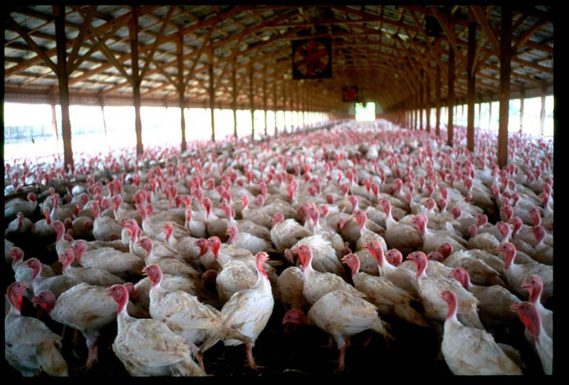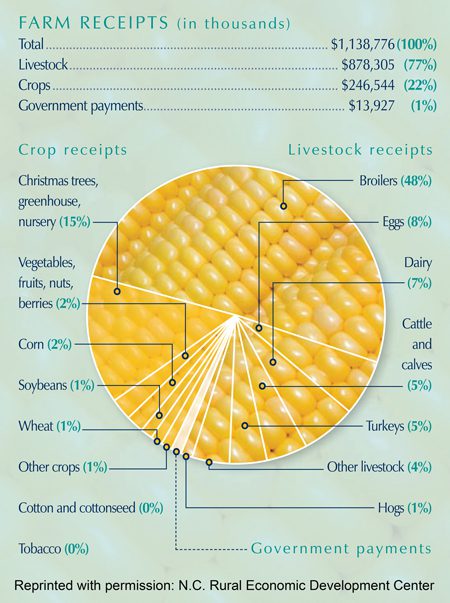Think globally, eat locally

Our new family Thanksgiving tradition is to run the neighborhood 5k and donate nonperishable food items as an entry fee. This run is my favorite of the year. It has social cause, allows one to eat guiltlessly and gives a good early winter jolt to the metabolism. Runners through the neighborhood see women parading into homes with covered dishes and boys (of all ages) playing football. The course is full of the smells of food cooking and leaves my mouth watering and belly growling. This run also reminds me of ways we can all “think globally and act locally.” The dinner table is an easy place to start such a lofty charge, especially here in North Carolina.
| N.C. is No. 1 in the nation in sweet potato production. Buy local, and try Martha Stewart’s Sweet Potato Souffle. Click here for a link to the recipe. |
Agriculture is big business in North Carolina. While the number of N.C. farms has been decreasing since World War II (to 52,000 farms in 2009) farm productivity has increased. Our farms generate approximately $10 billion in receipts annually, and N.C. ranks eighth nationally. North Carolina leads the nation in the production of tobacco (No. 1), sweet potatoes (No. 1) Christmas trees (No. 2), poultry and eggs (No. 2), turkeys (No. 2), strawberries (3), hogs and pigs (6), nursery, greenhouse, floriculture and sod (7), apples (7) and aquaculture (12). Tobacco (at 6 percent) is no longer the top generator of revenue in North Carolina. Livestock (27 percent), hogs (21 percent), Christmas trees / nursery / greenhouse (CNG) (10 percent) and turkeys (6 percent) contribute more to North Carolina’s agricultural economy. Many of our leading products are the mainstay of the holiday table.1
Charlotte Region Agricultural Production

Not many people realize that the greater Charlotte region ranks third in farm receipts in the state behind the east and southeast regions. The graph at left shows that the regional top contributors to our agricultural economy are broilers (48 percent), CNG (15 percent), eggs (8 percent), dairy (7 percent), cattle and other livestock (9 percent), and turkeys (5 percent). Several of our counties can claim top producer in the state. The state’s No. 1 producers include Alexander County (eggs), Iredell (cattle and dairy), Union (wheat) and Mecklenburg (CNG). Union County generated more than $400 million in agricultural revenue in 2009 and ranked third in the state for farm receipts. Union County is a top ten producer of broilers, turkeys, cattle, eggs and wheat. 1
Eating locally grown foods can make a big difference in many ways. Staff at the North Carolina Research Campus and the NCDA Piedmont research station in Salisbury can attest to the higher nutrient and bioactive content in fresher food. Consumer and chef alike would claim flavor is better, too. Chronic disease expenditures in North Carolina reached $40 billion in 2003 and the majority of the money spent was for preventable chronic diseases, where diet contributes to morbidity. Nationally, N.C. ranks 12th for adult obesity; more than a third of our teens are overweight or obese. Increasing consumption of fresh, healthful foods decreases sickness and healthcare expenditures. The UNC Chapel Hill Nutrition Research Institute encourages all to eat a rainbow a day.2
In the region, we have some worrisome trends for farms. Our region’s population has roughly doubled since the 1970s to 2.1 million, and our farms are decreasing in number and acreage (Charlotte region farms are just over 100 acres per farm, unlike our cousins in the east, where farms average 470 acres).1
A recent study funded by the N.C. Rural Economic Development Center identified the greatest challenges for our farm production as population growth and urban expansion. Within each problem there is an opportunity. Tapping into population growth can lead to increased demand for local, natural and organic foods. Simply stated: Eat locally, and Thanksgiving is the perfect season to do so. 1
Charlotte-based Compass Group, the world’s largest food service company and the North Carolina Cooperative Extension Service, Center for Environment Farming Systems and Golden LEAF Foundation developed the “10% Campaign” (a pledge to spend 10 percent of food dollars locally). The guide, From Farm to Fork highlights some significant findings. Annually, North Carolina residents spend $35 billion a year on food. If we were to focus on buying at least 10 percent of our foods locally, we would boost the state economy by $3.5 billion a year. Nationally, organic foods sales have reached almost $25 billion and local food sales are expected to reach $7 billion by 2011. Direct-market venues (e.g. farmers markets) continue to increase in popularity, and revenues are $29 million a year. The economic impact of expanding N.C.’s market locally will result in new farm, food and manufacturing businesses and create jobs. 2
The Charlotte region is perfectly poised at the urban/rural fringe to take the lead in revitalizing our agricultural heritage by continuing to strengthen its local purchases. So let’s shift from killing ourselves to healing ourselves with knife and fork, and building our economy one mouthful at a time by selecting produce from North Carolina. Think globally and eat locally.
Views expressed in this commentary are those of the author and do not necessarily represent the views of the UNC Charlotte Urban Institute, its staff, or the University of North Carolina at Charlotte.
1North Carolina Agriculture: Regional Perspectives by the N.C. Rural Economic Development Center. To download the full report click here.
2Farm to Fork: A Guide to Building North Carolina’s Sustainable Local Food Economy by the Center for Environmental Farming Systems. To download the report, click here.
Marjorie Benbow is an attorney at Moretz & Skufca and focuses on technology transfer, licensing, corporate matters and general practice. Previously she managed the intellectual property at UNC Charlotte and later was science and technology officer for N.C.’s fourth largest hospital system and the executive director for the North Carolina Biotechnology Center in the region. Reach her at mtb@moretzandskufca.com.
Marjorie Benbow